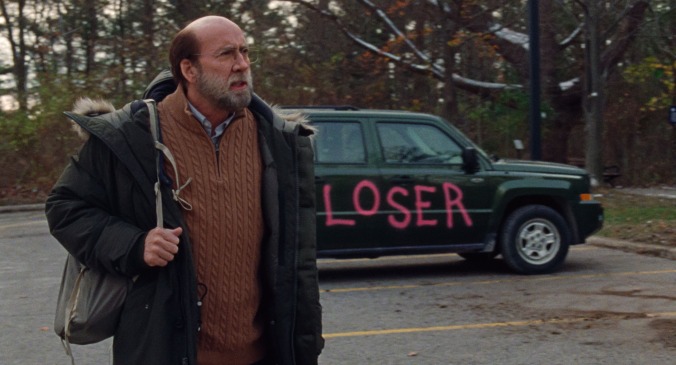Dream Scenario review: Visions of Nicolas Cage
A high-concept story and a committed Nic Cage add up to an entertaining trip, but it could've been so much more

For children of the ’70s and ’80s, it’s great to see Talking Heads getting a moment in the sun again. From Spike Lee directing David Byrne to Miley Cyrus having him on her New Year special, and Stop Making Sense doing the Imax rounds, it feels like sweet vindication for a band that had all but disappeared for some time. With that said, Kristoffer Borgli, you do not get the right to appropriate their end-credits song, “City of Dreams,” from Byrne’s movie masterpiece True Stories, and use it for your own finale in Dream Scenario. Not only does it feel like a cheap shortcut for anyone who has seen True Stories (which should be all of you, but that’s another conversation), but the superficial “Dream”/“Dreams” word association misunderstands the song just as surely as if Nirvana’s “Polly” became the theme tune for a talking parrot cartoon.
The song-snatch is but one symptom of how surface-level the movie. Not that it isn’t entertaining—with a committed Nicolas Cage and a high concept (in this case, literally one somebody would come up with while high), how could it not be? Dream Scenario is plenty fun, but also squanders the opportunity to be even more.
With massive male-pattern baldness and defensive physicality, Cage plays Paul Matthews, an evolutionary biology professor whose biggest career goal is to write a book about ants. Chronically insecure, he gets anxiety over the fact that he appears in one of his daughter’s dreams as a passive figure who won’t help her. Does she see him that way in real life? It soon becomes a moot point, as everyone in the world, or at least the immediate surrounding area, suddenly begins seeing him as a similarly passive bystander in their own nocturnal adventures of the subconscious.
Matthews promptly finds himself becoming famous for something he has no control over, and awkwardly tries to parlay it into the book deal he craves. It’s no stretch to apply this scenario to Cage himself, who takes his acting extremely seriously but finds himself more often memed and merchandised as the screaming maniac from his most emotionally intense freakout scenes. Yet such scenes remain his constant. As awkward as Paul is—Cage initially appears to be channeling a shy teenage girl for inspiration—the inevitable moment of losing his shit feels as unavoidable as it is cathartic. Only the narrative purpose changes; for Paul, in the spotlight, righteous rage can only make things worse.








































